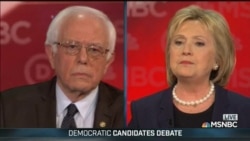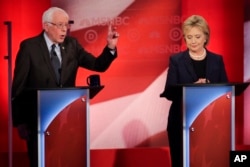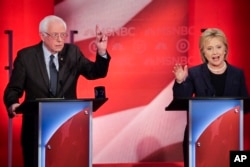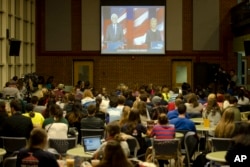The two remaining Democratic presidential candidates -- former Secretary of State Hillary Clinton and Vermont Senator Bernie Sanders -- held a tense and angry debate Thursday night in New Hampshire, days before the northeastern state holds the nation's first presidential primary.
Clinton trails Sanders by 20 points in the polls after barely beating him in the Iowa caucus. This is the first one-on-one debate between the two candidates; former Maryland Governor Martin O'Malley dropped out of the race after a poor showing in Iowa.
Now that voter preference actually starts to count toward who gets nominated, the cordial campaign is becoming heated and tense, with Clinton and Sanders bickering over who is the true progressive in the race, who is beholden to big money interests, and what is the biggest threat facing America.
Progressive title
Clinton, 68, called herself a "progressive who gets things done," saying the senator's proposals for free college and health care are promises that cannot be kept.
"The numbers just don't add up," she said, adding such ideas will raise taxes and make it hard for Americans to get ahead and stay ahead.
Sanders, 74, said these are not radical ideas. He said just about every other developed nation has free public college and single-payer health care for its citizens.
He added that his proposal for free tuition would be paid with a tax on Wall Street speculation, saying: "The middle class bailed out Wall Street in their time of need. Now, it is Wall Street's time to help the middle class."
The senator said Clinton once called herself a moderate. Sanders said no one can be a moderate and a progressive at the same time.
Wall Street influence
Clinton seemed also genuinely offended when Sanders pointed out that she has received high speaking fees from large Wall Street financial firms. He said big money in politics and Congress is one major reason for high drug prices and energy policies that rely on fossil fuels and big oil.
Clinton called it an "artful smear" and rejected accusations that anyone getting big money is being "bought." Clinton said she has never changed a view or a vote because of any donation.
Although she stopped short when asked to release transcripts of speeches she has given to Wall Street firms. She told MSNBC moderators she would "look into it."
Stipulations in her contracts, written by her own team, have called for limited public coverage of comments made in her speeches, The Associated Press reported. Media organizations have been rebuffed in their attempts to obtain copies of the speeches.
Sanders again boasted of raising millions from small contributors and that he is the only candidate in the race -- Democrat or Republican -- without a Super Pac -- a political action committee that raises unlimited sums from mainly wealthy donors.
Iraq, IS
On foreign policy, Sanders agreed that Clinton has more experience. But he added that judgment is necessary, too, again raising that Clinton, during her term as a New York senator, voted to support the invasion of Iraq, while he did not.
Clinton responded to his comment by saying, "A vote in 2002 is not a plan to defeat ISIS," an acronym for the Islamic State group. "We have to look at the threats we face right now," she added.
She then showed that foreign policy is her strength, offering a view of the world's toughest diplomatic disputes.
The two also split when questioned whether the U.S. should restore diplomatic relations with Iran. Clinton said it would remove any leverage the U.S. had in negotiating. Sanders, while saying the U.S. shouldn't normalize relations "tomorrow," said the country should try to "move forward."
Clinton, who only recently came out against the Trans-Pacific Partnership (TPP) trade deal, said she hopes the final version of the trade deal puts to rest her concerns for American workers. Sanders, saying he believes in trade, said he opposes any existing U.S. trade deals, including the TPP and North American Free Trade Agreement.
US troops
In one area of agreement, both candidates said they would want U.S. troops in the Middle East only in advisory or assistance roles. Clinton said large numbers of U.S. ground troops "is off the table," while Sanders said that "Muslim troops on the ground" would ultimately destroy the Islamic State group.
When faced with the issues of immigration, gun control and climate change, the candidates were asked which would be their top priority as president.
Clinton said she would not narrow her choices, instead offering she would work on an "ambitious, bold agenda" that included those three issues as well as health care and education.
Sanders instead said campaign finance reform needed to be a top priority for the next president, as well as making changes to health care and fixing "the broken criminal justice system."
Despite heated exchanges over issues, the two stated their mutual respect for one another. At one point, moderator Chuck Todd asked if Clinton, should she win the nomination, would consider Sanders as her running mate. She said it was presumptuous to pose such a question, but, if so, Sanders would be her first call.
Sanders agreed and said, "Sometimes in these campaigns things get out of hand. I respect the secretary, I hope it's mutual."
He added, "On our worst days, we are 100 times better than any Republican candidate," referring to the personal attacks often levied by the opposing party's candidates.
The two then shook hands.
Lively crowd
MSNBC hosted the 90-minute event Thursday at the University of New Hampshire in the small college town of Durham, before an oftentimes raucous and cheering crowd.
Sanders, who lives in the adjoining state of Vermont, has held a double-digit lead in polling over Clinton. A recent NBC/WSJ/Marist poll showed Sanders receiving the support of 58 percent of likely Democratic primary voters, while Clinton trailed, with 38 percent.
New Hampshire's presidential primary will be held Tuesday.
In addition, the two candidates have five more debates through the primary season. They are to debate in Wisconsin and Florida, and have debates lined up in April and May.
They also agreed to add a debate in March in Flint, Michigan, to draw attention to the city's contaminated water crisis ahead of the state primary on March 8.
During the debate, Clinton, who plans to visit Flint on Sunday, said the federal government needs to hold Michigan responsible for the "terrible burden" they have placed on the people in Flint, and should agree to pay their health care costs.
Sanders called for Michigan Governor Rick Snyder to resign, saying Flint's "children are being poisoned." He also questioned whether the toxic water issue in Flint, which has a large African-American population, would have occurred in a white suburban community.

















